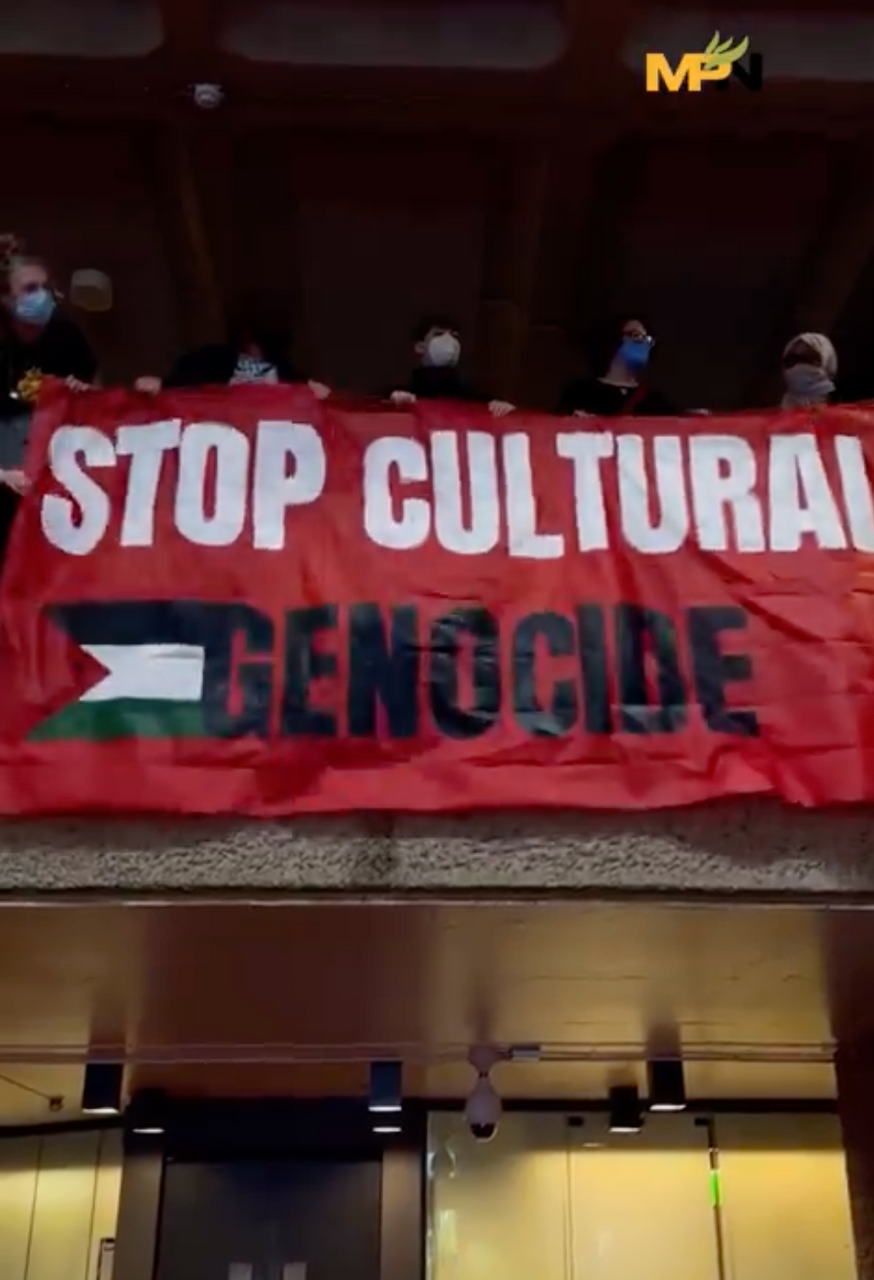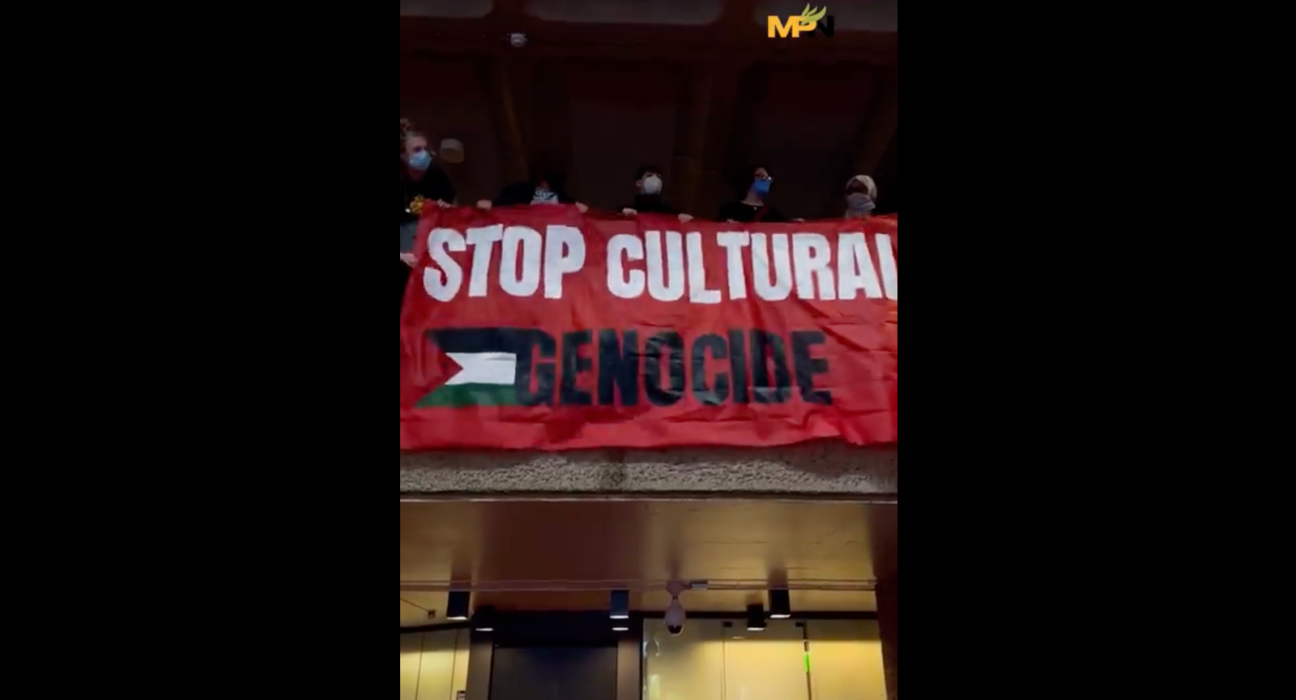On Saturday, hundreds of protesters occupied the Barbican Centre in London to oppose censorship of critics of Israeli mass murder in Gaza. They raised banners with slogans, such as “Stop the cultural genocide.”
The episode is part of an ongoing conflict between the Barbican, the largest performing arts center in Europe, and opponents of the horrifying genocide, which has already resulted in at least 100,000 Gazans dead, wounded or missing.

Various artists have withdrawn their work from the Barbican following the cancellation in February of a lecture series after center officials learned that one of the talks, to be given by well-known Indian writer Pankaj Mishra, was entitled “The Shoah After Gaza.”
The London Review of Books (LRB) was the sponsor of the series. A description of Mishra’s talk on the LRB website read:
A powerful western narrative holds the Shoah to be the incomparable crime of the modern era. But we find our moral and political consciousness profoundly altered when Israel, a country founded as a haven for the victims of genocidal racism, is itself charged with genocide.
What is the fate of universal values after Israel’s collapse into violent nationalism?
The Barbican released an evasive statement February 14, which claimed that the center was advertised by the LRB as the venue for the lecture series prematurely, while “discussions were ongoing, and before an agreement to hold the events had been finalised. That meant that we lost the opportunity to properly consider how to hold the events with care, or to do the preparation they would need.” According to Artnet, the “LRB denies this version of events, stating that the lecture had been canceled ‘at a late stage.’”
Mishra told the Guardian that he was “not surprised,” but that “it’s still shocking,” He continued, “The whole point of culture and the arts is to embrace diversity, different viewpoints and protect imaginative freedom.
“It’s become clear,” the Indian novelist and essayist said, “that war crimes have been committed on a daily basis and powerful people who have supported the Israeli regime are doubling down on their untenable position. That breeds a pervasive sense of fear and panic that infects even cultural institutions.”
Starting in late February, artists began pulling their works from the Barbican.
Artnet reports that collectors Lorenzo Legarda Leviste and Fahad Mayet, considering the Barbican’s decision to be censorship, “requested the two quilts by Gee’s Bend artist Loretta Pettway that they lent to the institution be removed from the exhibition Unravel: The Power and Politics of Textiles in Art, which opened on February 13.”
Leviste and Mayet explained:
As lenders to the exhibition, which explicitly aligns itself with values of “resistance,” “protest,” “solidarity,” and “liberation,” we were disturbed and alarmed by the Barbican’s late-stage cancellation of the lecture …
We sought to engage the Barbican in a dialogue, asking for transparency and accountability to explain the internal processes that led to the decision to cancel the LRB lecture, but it has only been able to provide the purposefully vague, amorphous language commonly deployed by institutions to shut down any discussion on Palestine, rendering decisions like this cancellation incontestable.
We believe this cancellation can only be classified as the Barbican’s censorship of the LRB and Pankaj Mishra.
Other artists followed suit. Artnet noted on March 11 that “Lebanese artist Mounira Al Solh is the latest artist to request their work be withdrawn today. This afternoon, the foundation Art Jameel also requested the removal of a work it lent by Filipino artist Pacita Abad. Last week, Filipino artist Cian Dayrit, American artist Diedrick Brackens, and French-Moroccan artist Yto Barrada also requested that their works be removed from the show.”
Barrada explained, “We cannot take seriously a public institution that does not hold a space for free thinking and debate, however challenging it might feel to some staff, board members, or anxious politicians.”
Brackens said that “the censorship of Mishra had sullied the show’s ‘well-intentioned vision’ and called for Unravel to be closed ‘in solidarity with those calling for immediate ceasefire.’”
He added,
It is disheartening that this exhibition has to be dismantled work by work in order to expose the complicity of the institution in silencing those of us who are speaking out against the historical and ongoing violence being committed in Gaza.
In response to the defections, Claire Spencer, Barbican CEO, felt obliged to release a defensive statement on March 8. As has been the case with every arts institution official who has closed down or prevented criticism of Israel since the onslaught against the Gazan population began, Spencer begins by swearing allegiance to “the importance of protecting and maintaining artistic freedom and freedom of speech.”
She went on, “Artists and cultural institutions play a crucial role in reflecting, commenting on and responding to the issues of the day,” except when artists make those institutions uncomfortable, anger their trustees or threaten their funding.
Spencer added:
We recognise the decision has created significant concern about artistic freedom, and which voices are given a platform to speak during this moment of deep humanitarian crisis. We are sorry for the distress we have caused to everybody who feels we have let them down.
Our intention is never to censor and always to host the widest possible range of artists and thinkers, and we collaborate with thousands of different partners and organisations every year to do this.
To their credit, the artists have not been mollified, and the occupation-protest on Saturday was the latest skirmish in this conflict.

